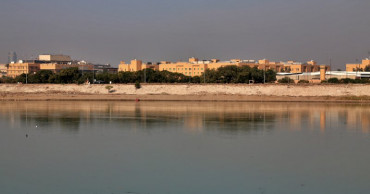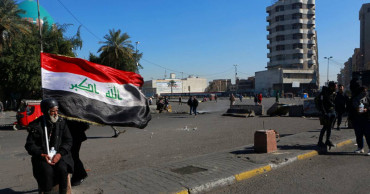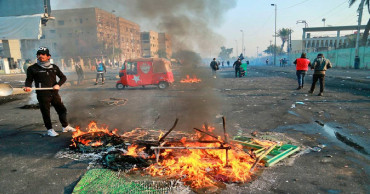Baghdad
Real coffee, but a fake 'Starbucks' in piracy-ridden Iraq
Everything from the signboard outside down to the napkins bears the official emblem of the top international coffee chain. But in Baghdad, looks are deceiving: The “Starbucks” in the Iraqi capital is unlicensed.
Real Starbucks merchandise is imported from neighboring countries to stock the three cafes in the city, but all are operating illegally. Starbucks filed a lawsuit in an attempt to shut down the trademark violation, but the case was halted after the owner allegedly threatened lawyers hired by the coffee house.
Be careful, he told them — and boasted of ties to militias and powerful political figures, according to U.S. officials and Iraqi legal sources.
“I am a businessman,” Amin Makhsusi, the owner of the fake branches, said in a rare interview in September. He denied making the threats. “I had this ambition to open Starbucks in Iraq.”
After his requests to obtain a license from Starbucks' official agent in the Middle East were denied, “I decided to do it anyway, and bear the consequences.” In October, he said he sold the business; the cafes continued to operate.
Starbucks is “evaluating next steps,” a spokesman wrote Wednesday, in response to a request for comment by The Associated Press. “We have an obligation to protect our intellectual property from infringement to retain our exclusive rights to it.”
The Starbucks saga is just one example of what U.S. officials and companies believe is a growing problem. Iraq has emerged as a hub for trademark violation and piracy that cuts across sectors, from retail to broadcasting and pharmaceuticals. Regulation is weak, they say, while perpetrators of intellectual property violations can continue doing business largely because they enjoy cover by powerful groups.
Counterfeiting is compromising well-known brands, costing companies billions in lost revenue and even putting lives at risk, according to businesses affected by the violations and U.S. officials following their cases.
Qatari broadcaster beIN estimated it has lost $1.2 billion to piracy in the region, and said more than a third of all internet piracy of beIN channels originated from companies based in northern Iraq. The complaint was part of a a public submission this year to the U.S. Special 301 Report, which publicly lists countries that do not provide adequate IP rights.
Read more: 8 killed in attack by gunmen on an Iraqi village: Official
Iraq is seeking foreign investment away from its oil-based economy, and intellectual property will likely take center stage in negotiations with companies. Yet working to enforce laws and clamp down on the vast web of violations has historically been derailed by more urgent developments in the crisis-hit country or thwarted by well-connected business people.
“As Iraq endeavors to diversify its economy beyond the energy sector and attract foreign investment in knowledge-based sectors, it is critical that companies know their patents and intellectual property will be respected and protected by the government,” said Steve Lutes, vice president of Middle East Affairs at the U.S. Chamber of Commerce.
Makhsusi insists he tried the legal route but was denied a license from Starbucks' regional agent based in Kuwait. He also said he attempted to reach Starbucks through contacts in the United States, but that these were also unsuccessful.
He depicts his decision to open a branch anyway as a triumph over adversity.
Cups, stir sticks and other Starbucks merchandise are obtained in Turkey and Europe, using his contacts, he said. “The coffee, everything is authentic Starbucks,” Makhususi added.
Makhsusi said he “had a session” with a lawyer in Baghdad to come to an understanding with the coffee company, “but so far we have not reached a solution.”
The law firm recounts a different version of events.
Confidentiality agreements prevent the firm from divulging details of the case to third parties, but the AP spoke to three Iraqi legal sources close to the case. They spoke on condition of anonymity in order to provide details. They also asked the name of the firm not be mentioned for security reasons.
They said that in early 2020, the firm was hired by Starbucks and sent a cease-and-desist notice to Makhsusi. They said that the businessman then told one of the lawyers on the case that he ought to be careful, warning that he had backing from a prominent Iranian-backed armed group and support from Iraqi political parties.
“They decided it was too risky, and they stopped the case,” the Iraqi legal source said. Makhsusi denied that he threatened Starbucks' lawyers.
Read more: Heavy gunfire rocks Iraq's Green Zone amid violent protests
Makhsusi said doing business in Iraq requires good relations with armed groups, the bulk of whom are part of the official state security apparatus.
“I have friendly relations with everyone in Iraq, including the armed factions,” he said. “I am a working man, I need these relationships to avoid problems, especially given that the situation in Iraq is not stable for business.”
He did not name particular armed groups he was in contact with. The AP contacted two groups known to have business dealings in the areas where the cafes are located, and both said they had not worked with Makhsusi.
Counterfeiters and pirates have stepped up activity in Iraq in the past five years, particularly as Gulf countries have responded to U.S. pressure and become more stringent regulators, said a U.S. official in the State Department, speaking on condition of anonymity because he was not authorized to talk about the trends.
The broadcaster beIN has sent cease-and-desist letters to Earthlink, Iraq’s largest internet service provider, which offers subscribers with a free streaming service, Shabakaty, composed almost entirely of pirated content, beIN has said. Iraq’s Communications Ministry, which partners with Earthlink, did not respond to a request for comment.
“It’s unheard of and completely outrageous,” said Cameron Andrews, director of beIN’s anti-piracy department. “It’s a huge market, so it’s a great deal of commercial loss.”
But the larger issue for beIN is the piracy that originates inside Iraq and bleeds into the rest of the region and the world, he said. After being copied by these companies, beIN’s channels are re-streamed on pirate IPTV services, and become accessible all over the region, according to beIN. The company’s investigation found that some Iraqi operators even distribute pirated content in the U.S.
At least two U.S. pharmaceutical companies have approached the U.S. Chamber of Commerce with complaints that their trademark was being used to sell counterfeit life-saving medication by Iraqi companies.
“I worry if regulatory lapses or infringements in IP protection are allowed, then U.S. companies will be deterred from doing business in Iraq and quality of care could be dangerously jeopardized for Iraqi patients,” said Lutes.
The companies did not accept to be named in this report or detail the types of medications.
Successive Iraqi governments promised to fight graft since the 2003 U.S.-led invasion reset Iraq’s political order, but none has taken serious steps to dismantle the vast internal machinery that enables state-sanctioned corruption.
Intellectual property has also historically been a low priority for Iraq. Limited bilateral talks with the U.S. over the issue have been on and off for the past five years.
The challenge is to find a “clear leader in the Iraqi government that is interested in IP issues as a way to attract foreign investment,” said a U.S. State Department official. “Until that person exists, it is difficult for us to engage.”
3 years ago
Iran closes border to Iraq, flights stop amid violent unrest
Iran closed its land borders to Iraq as flights to the country halted Tuesday amid violence in Baghdad following an influential Shiite cleric's announcement he would resign from politics.
The death toll rose to 20 Iraqis on Tuesday after the unrest erupted the previous day, according to a senior medical official.
Iraq's military said four rockets were launched into the heavily fortified Green Zone, the seat of Iraq's government where armed clashes raged overnight between a militia royal to Iraqi cleric Muqtada al-Sadr and Iraqi security forces.
Iranian state television cited “unrests” and “curfew” in Iraqi cities for the reason for the border closures. It urged Iranians avoid any travel to Iraq while urging Iran's Shiite pilgrims in Iraq to avoid further travel between cities.
Also read: Clashes erupt after Iraqi Shiite cleric resigns, 15 dead
The decision came as millions of Iranians were preparing to visit Iraq for annual pilgrimage to Shiite sites.
Kuwait meanwhile has urged its citizens in neighboring Iraq to leave the country. The state-run KUNA news agency also encouraged those hoping to travel to Iraq to delay their plans over the eruption of violent street clashes between rival Shiite groups in the country.
The tiny Gulf Arab sheikhdom of Kuwait shares a 254 kilometer (158 mile)-long border with Iraq.
Dubai's long-haul carrier Emirates stopped flights to Baghdad on Tuesday over the ongoing unrest in Iraq. The carrier said that it was “monitoring the situation closely.”
It did not say whether flights would resume for Wednesday.
Also read: Officials: Landslide at Shiite shrine in Iraq kills 7
Protesters loyal to cleric Muqtada al-Sadr, who resigned Monday, pulled down the cement barriers outside the government palace with ropes and breached the palace gates. Many rushed into the lavish salons and marbled halls of the palace, a key meeting place for Iraqi heads of state and foreign dignitaries.
Iraq’s military announced a nationwide curfew, and the caretaker premier suspended Cabinet sessions in response to the violence. Medical officials said dozens of protesters were wounded by gunfire and tear gas and physical altercations with riot police.
3 years ago
Tension rises in Iraq after failed bid to assassinate PM
The failed assassination attempt against Iraq’s prime minister at his residence on Sunday has ratcheted up tensions following last month’s parliamentary elections, in which the Iran-backed militias were the biggest losers.
Helicopters circled in the Baghdad skies throughout the day, while troops and patrols deployed around Baghdad and near the capital’s fortified Green Zone, where the overnight attack occurred.
Supporters of the Iran-backed militias held their ground in a protest camp outside the Green Zone to demand a vote recount. Leaders of the Iran-backed factions converged for the second day on a funeral tent to mourn a protester killed Friday in clashes with security. Many of the faction leaders blame the prime minister for the violence.
Prime Minister Mustafa al-Kadhimi suffered a light cut and appeared in a televised speech soon after the attack by armed drones on his residence. He appeared calm and composed, seated behind a desk in a white shirt and what appeared to be a bandage around his left wrist.
Seven of his security guards were wounded in the attack by at least two armed drones, according to two Iraqi officials. They spoke on condition of anonymity because they were not authorized to give official statements.
Al-Khadimi called for calm dialogue. “Cowardly rocket and drone attacks don’t build homelands and don’t build a future,” he said in the televised speech.
Read: Iraqi prime minister survives assassination bid with drones
Condemnation of the attack poured in from world leaders, with several calling Al-Khadimi with words of support. They included French President Emmanuel Macron, Jordan’s King Abdullah II and British Prime Minister Boris Johnson. Saudi Arabia called the attack an apparent act of “terrorism.” Egypt’s President Abdel Fattah el-Sissi on Facebook urged all sides in Iraq to “join forces to preserve the country’s stability.”
Secretary of State Antony Blinken talked with al-Kadhimi on Sunday to relay U.S. condemnation of the attack and to underscore that the U.S. partnership with the Iraqi government “is steadfast,” State Department spokesman Ned Price said.
Also on Sunday, al-Khadimi met with Iraqi President Barham Salih and headed security and Cabinet meetings.
A security video showed the damage to his residence: a van parked outside the residence badly mangled, a shallow crater near the stairs, cracks in the ceiling and walls of a balcony and broken parts of the building’s roof. Two unexploded rockets were filmed at the scene.
There was no claim of responsibility, but suspicion immediately fell on Iran-backed militias. They had been blamed for previous attacks on the Green Zone, which also houses foreign embassies.
The militia leaders condemned the attack, but most sought to downplay it.
Read: Colin Powell: A trailblazing legacy, blotted by Iraq war
It was a dramatic escalation in the already tense situation following the Oct. 10 vote and the surprising results in which Iran-backed militias lost about two-thirds of their seats.
Despite a low turnout, the results confirmed a rising wave of discontent against the militias that had been praised years before as heroes for fighting Islamic State militants.
But the militias lost popularity since 2018, when they made big election gains. Many hold them responsible for suppressing the 2019 youth-led anti-government protests, and for undermining state authority.
The attack “is to cut off the road that could lead to a second al-Kadhimi term by those who lost in the recent elections,” said Bassam al-Qizwini, a Baghdad political analyst. “They started escalating first in the street, then clashed with Iraqi Security Forces, and now this.”
On Friday, protests by supporters of the pro-Iran Shiite militias turned deadly when the demonstrators tried to enter the Green Zone where they had been camped out, demanding a recount.
Security forces used tear gas and live ammunition. There was an exchange of fire in which one protester affiliated with the militias was killed. Dozens of security forces were injured. Al-Khadimi ordered an investigation.
“The blood of martyrs is to hold you accountable,” said Qais al-Khazali, leader of the Asaib Ahl al-Haq militia, addressing al-Kadhimi in recorded comments to supporters. He blamed him for election fraud.
In the strongest criticism of the prime minister, Abu Ali al-Askari, a senior leader with one of the hardline pro-Iran militias, Kataib Hezbollah, questioned whether the assassination attempt was really al-Kadhimi’s effort to “play the role of the victim.”
“According to our confirmed information no one in Iraq has the desire to lose a drone on the residence” of al-Kadhimi, al-Askari wrote in a Twitter post. “If anyone wants to harm this Facebook creature there are many ways that are less costly and more effective to realize that.”
Iran’s Foreign Ministry spokesman Saeed Khatibzadeh condemned the assassination attempt on al-Khadimi and indirectly blamed the U.S.
The escalation also reveals a level of nervousness among Iran and its allies as they realize that political results don’t always translate into control, said Joseph Bahout, a director of research at the American University of Beirut.
“This is an act depicting fear of loss of control. Al-Khadimi is being now perceived as a Trojan horse for more erosion of Iran’s grip on the country,” Bahout said.
Al-Kadhimi, 54, was Iraq’s former intelligence chief before becoming prime minister in May last year. He is considered by the militias to be close to the U.S., and has tried to balance between Iraq’s alliances with both the U.S. and Iran.
Prior to the elections, he hosted several rounds of talks between regional foes Iran and Saudi Arabia in Baghdad in a bid to ease regional tensions.
Marsin Alshamary, an Iraqi-American research fellow with the Harvard Kennedy School’s Belfer Center, said the attack resurfaced the long-term challenge of how to curb the powers of the militias without triggering a civil war.
For al-Kadhami, the stakes are now higher if he is to remain as prime minister.
“He doesn’t have a political party and so he is susceptible to direct attack with no party to negotiate or protect him,” she added.
Iraq’s election commission has yet to announce the final results. The parliament could then convene, elect a president and form a government.
The U.S., the U.N. Security Council and others have praised the election, which was mostly violence-free and without major technical glitches.
But the unsubstantiated fraud claims have cast a shadow over the vote. The standoff with the militia supporters has increased tensions among rival Shiite factions that could spill into violence and threaten Iraq’s newfound relative stability.
Influential Shiite cleric Muqtada al-Sadr, who won the largest number of parliament seats in the Oct. 10 elections, denounced the “terrorist attack,” which he said seeks to return Iraq to the lawlessness and chaos of the past. While al-Sadr maintains good relations with Iran, he publicly opposes external interference in Iraq’s affairs.
4 years ago
Islamic State claims deadly and rare twin blasts in Baghdad
The Islamic State claimed responsibility for a rare suicide attack that rocked central Baghdad, killing 32 people and wounding dozens.
5 years ago
With virus, cherished Mideast traditions come to abrupt halt
Under the sign "Take out only" and a tall bottle of antiseptic by his side, Mazin Hashim, 54, rearranged the coals heating a water pipe outside his famed cafe in Baghdad.
5 years ago
Iraq confirms 8 new cases of COVID-19 with further precautionary measures
Iraqi Health Ministry on Friday announced eight new cases of COVID-19, bringing the number of the confirmed cases to 46 in the country, of whom four have died.
5 years ago
Rockets strike near US Embassy in Baghdad; no injuries
At least four rockets hit near the sprawling U.S. Embassy in Baghdad and a Iraqi base hosting American troops inside the Green Zone early Sunday, but caused no casualties and only minor damage, U.S. and Iraqi officials said.
6 years ago
3 grenades hit security forces protecting protesters in Baghdad
Iraqi security forces tasked with protecting the anti-government protests in Baghdad were attacked by hand grenades on Thursday, the Iraqi military said.
6 years ago
Nighttime attack on US Embassy in Baghdad injured 1
A top US commander said on Monday mortars were used in an attack on the American embassy in Baghdad that injured one person and caused some material damage the previous night, not katyusha rockets as was initially reported by staffers and a statement from the military.
6 years ago
Iraqi officials: At least 13 wounded in violence in Baghdad
Iraqi security forces fired tear gas and live rounds during clashes with anti-government protesters overnight and on Monday morning in Baghdad, wounding at least 13 demonstrators and prompting authorities to close key streets and thoroughfares leading to the city center, officials said.
6 years ago
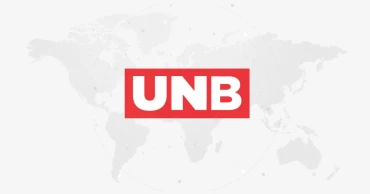

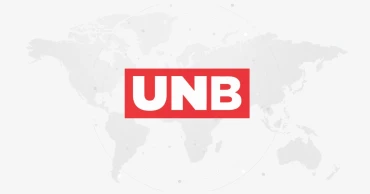
.jpg)
.jpg)
